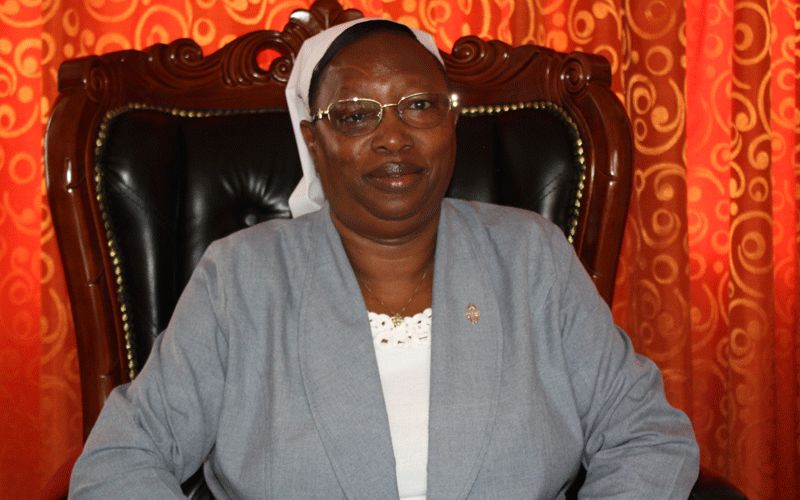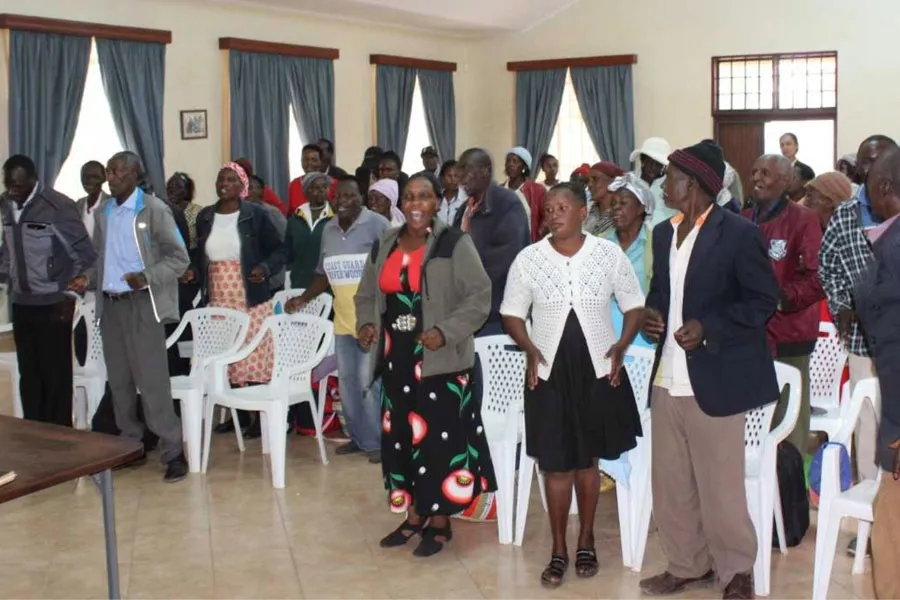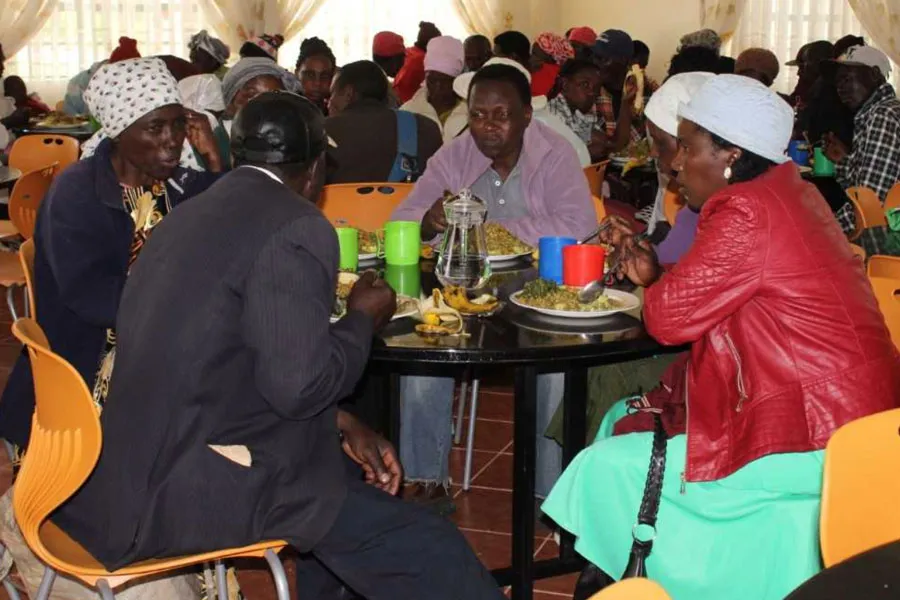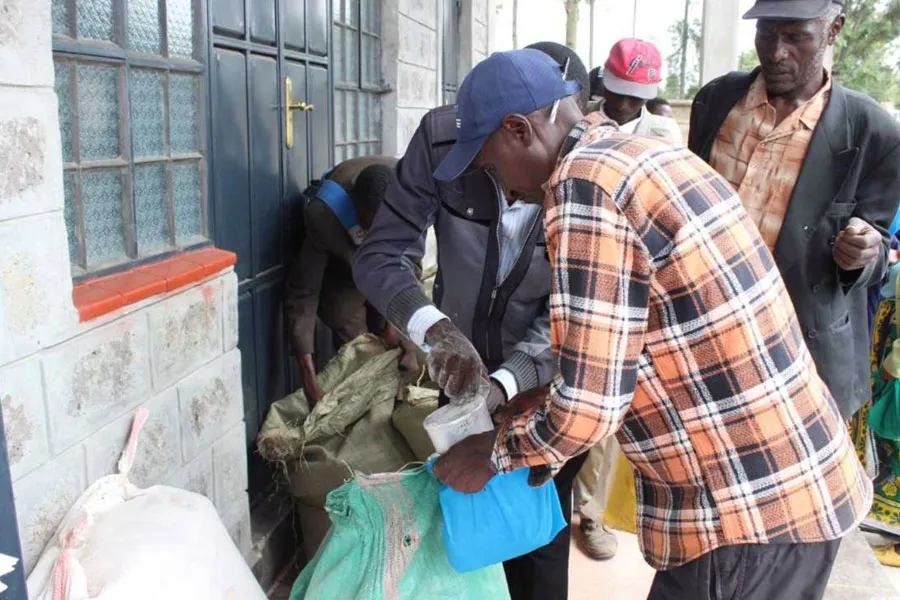At a CD4 count of only 2 cells per cubic millimeter of blood, Margaret was in a critical condition. She had long been fired from her well-paying secretarial job and left to fend for herself by her family when some family members learnt that she was diagnosed with the “monster disease”.
Sr. Florence Muia of the Assumption Sisters of Nairobi (ASN) recalls the dark days of HIV in Kenya when infected people faced the highest degree of stigma.
“Before the president declared HIV a national disaster, around 1999, there was a lot of ignorance about the condition. There was a lot of denial for people who were infected and they faced rejection from people who were close to them,” says Sr. Florence.
She adds, “People had many names for HIV and AIDS. They called it “animal”, “monster”, others referred to it as “slim” because of how infected people looked wasted. They thought the disease was contagious and so they locked infected people away in tiny houses and left them there to die.”
The Kenyan-born Catholic nun recounts, while working as a probation officer under the Ministry of Home Affairs and National Heritage at Nakuru Girls Probation Hostel, Kitui District and in Naivasha District around flower plantations in Naivasha in the 1990s, how people who worked menial jobs on the plantations and in flower factories were kicked from their jobs when their employers learnt that they were infected.
(Story continues below)
Sr. Florence was the first nun in Kenya to serve as a probation officer, a position she held from 1990 to 1998.
Others, according to the Catholic nun, simply couldn’t work because they were very sick.
Those infected were secluded even in death. “When those infected with HIV died, they were buried by well-wishers in polythene bags. People feared being infected by getting in contact with the corpses,” says Sr. Florence, adding that over 700 deaths were reported every day nationally.
This was long before then President Daniel Moi declared the condition a national disaster, calling the rapidly spreading disease a threat to the country's "very existence."
Unfortunately, by the time the President made the remarks, in November 1999, the disease had killed 760,000 Kenyans who were unable to access medication.
But long before the announcement, the ASN nun, who had, for years, seen the struggles of people with HIV were going through in their deprived backgrounds, and who was now a student in the United States, was working behind the scenes to push for an HIV/AIDS initiative in the U.S. that would later see the United Nations give HIV drugs for free to people in developing countries.
The Catholic nun narrates how she animatedly lobbied for support of a bill that then Congressman Henry Hyde, U.S House of Representative from Illinois introduced in parliament to fund HIV treatment in these countries, Kenya being one of them.

“I worked with a strong lobbying group in Wheaton to rally for support of a bill that Congressman Hyde introduced in government to fund HIV treatment. I met the Congressman in 2003 and he asked me to report back to him on the success of the initiative,” she recalls, adding that the following year, she met the Secretary of the Congressman again after the price of HIV drugs was subsidized.
The bill would later be made into an Act and reauthorized by President George Bush in 2008, allowing for more access to ARVs in developing countries.
And long before she jetted back to Africa, with a firm decision to provide care to the patients who were labelled society rejects, Sr. Florence had attended numerous global conferences on HIV/AIDs and she was convinced that the patients had better living conditions in other countries.
“I attended so many conferences that were focused on HIV while I studied in the U.S. and I listened to speeches from all over the world. The reports that were given in these speeches pointed to immense support of HIV patients in these countries. It was a sharp contrast to what I saw in my own country where there was a lot of ignorance, stigma and lack of medication for the HIV patients,” says Sr. Florence.
She adds, “I think this is when I felt a nudging in my heart to do something for my brothers and sisters in Kenya who were in dire need of love and care.”
What followed were years of blood, sweat and tears for the nun who had been raised in a humble background and introduced to Church by a prayerful grandmother and with the support of an unbaptized mother.
The story of Sr. Florence who battled all odds in a humble background to establish a state-of-the-art facility for HIV patients is a story of immense struggle just as it is a source of hope to thousands of HIV patients from deprived backgrounds in Naivasha, a town in Kenya’s Nakuru diocese.
Born in 1957 in a family of nine children where she is the fifth born, little Florence Muia went through the challenges that are typical to any young girl in a village. It was a humble family where her mother was a dedicated housewife while her father worked menial jobs at Kenya Railways in the country’s capital city, Nairobi.
“We were quite poor. In fact, my three elder sisters only went as far as primary school. This was all my mother who was a peasant farmer in the village could afford to pay for,” recalls Sr. Florence, adding that she repeated Class Seven two times to allow for her elder siblings to be admitted in secondary school.
She would later enroll herself into a high school where she walked 16 kilometers to and from school every day. At one point, she dropped out of school because of lack of school fees but returned, 10 years later, to quench her undying thirst for education.
It was Sr. Florence’s ageing grandmother who introduced her to the Catholic faith when she was a Class Five girl, a time that little Florence Muia also started mingling with nuns at the Franciscan Missionary Sisters of Africa who worked at Kanzalu Catholic Church, then a Parish within the Catholic Diocese of Machakos in Kenya.
“My mother hardly ever went to Church. I guess she just had a lot to do taking care of us. Even then, she wasn’t baptized and so, my grandmother stepped in to introduce us to the Church. I followed her to all prayer groups in the village,” narrates Sr. Florence.
The young Florence Muia would later enroll for Catechism classes and got baptized while she was still in Primary School, receiving her First Holy Communion.
She explains, “I worked for my own faith. I was never baptized as an infant. I attended Catechism classes and got baptized when I was 15 years old.”
The first time she expressed her desire to become a religious sister, her mother was reproachful. She shelved the idea. She tried again after she completed her Form Two. Her mother who had been baptized aged 40 was now more approachable. She had just gotten an acceptance letter from ASN. Her desire to lead a religious life had already been cemented in her life and there was no turning back.
“When I was young, I used to say that when I grow up, I want to be a nun or to work in a community. I was touched by the humility of the nuns that worked in our schools and in our parish. That’s why I later developed an interest in social work. To be able to impact lives of the less privileged,” she recounts, adding that she joined ASN for formation in January 1976 and had her first profession on December 27, 1978.
Her first appointment in Kenya’s Catholic Diocese of Kitui was at Kitui School for the Deaf where she served in the boarding section for the hearing impaired. She then went back to school, ten years later, where she beat all odds, including sitting in class with much younger students, to score a Second Division, which is equivalent to a B Plus in her final examinations. Sr. Muia was 28 years old when she accepted a position in Form Three at Mbooni Girls High School.
She had work stints as a Probation officer under the Ministry of Home Affairs and National Heritage as it was referred to at the time before enrolling for a degree at Catholic University of Eastern Africa (CUEA) where she graduated in 1996 with a degree in Sociology and Anthropology, managing First Class honors.
It was also while working at Maria Goretti Girls Hostel in Thika, that the Kenyan nun interacted with Pope John Paul II on the Pontiff’s second visit to Kenya in 1985 during the 43rd International Eucharistic Congress held in Nairobi where she served as the Pope’s Sacristan.
During the Papal visit, Sr. Florence led a team of other nuns in preparing the altar during the Eucharistic celebrations at Nairobi’s Uhuru Park and Nyayo Stadium. She was also the chief sacristan of the Pope the entire period.
Sr. Florence worked for another two years before she won a scholarship to study Pastoral Counselling, a Master’s program at a Jesuit University in the United States, a time that she started attending conferences on HIV/AIDS and graduated in 2001 with a mission to start a programme for the care of infected people in Kenya.
“While studying in the U.S., I made numerous visits back home and kept visiting HIV patients. So, when I came back and started the programme, I already had an idea of what I wanted to do,” she recalls.
In 2002, when Sr. Florence approached then CDN Bishop Peter Kairo, now Archbishop Emeritus, she already had the name of the facility in mind. It would be named Upendo Village, a sanctuary for people living with HIV/AIDS who had been secluded by society.
“I wanted all of them (HIV/AIDs patients) to have a feel of God’s unconditional love. They had been abandoned and those who had pity on them threw food to them, not daring to come close to them. I wanted to reach close to them and to make them feel they were loved,” Sr. Florence explains.
It was Bishop Kairo who gave her three acres of land from eight acres that had been set aside for building a school in Naivasha.
Upendo Village had a humble beginning in two dilapidated classrooms that had once been a nursery school. Sr. Florence’s task, with support of Wheaton Franciscan Sisters, a congregation of religious sisters in the U.S. that supported HIV/AIDs initiative, was to renovate the classrooms and to convert them into the HIV facility.
The group has recorded an impact of 13,508 individuals including HIV infected people and individuals in a number of vulnerable groups.
“He (Kairo) was very passionate about the idea of building a facility for people who lived with HIV. He told me it was a huge outcry that needed to be heard,” the Kenyan nun recalls.
Her first initiative was a community outreach programme where the nun, armed with a donated car, carried porridge and warm water in thermos flasks, which she took to the patients in their homes.
“I would dry bathe them, feed them on the porridge and talk about God’s love. Some wondered why I was not scared of them. Then they slowly started opening up to me,” she recounts, adding, “Slowly, I started encouraging them to go to hospitals for treatment.”
As the days went by, members of Small Christian Communities in the diocese and volunteers from other denominations who were moved by Sr. Florence’s acts of kindness joined the outreach program.
And in 2003, she held her first training that attracted 30 volunteer health workers. The ASN nun however, notes, “Most of them (volunteers) dropped from the programme when they realized that I didn’t have any money to pay them.”
In 2004, Upendo Village got a nurse.
“We would go around with the nurse, carrying medication to treat the patients’ opportunistic infections that were as a result of the virus and fixing drips in little dark rooms that housed the patients,” she recalls.
From one nurse, the facility has grown into a fully staffed dispensary that has a pharmacy, a dental department, a lab section, a Voluntary Counselling and Testing (VCT) center and other departments that are open to the public, including people who aren't infected with HIV/AIDS.
Apart from the dispensary, there is a water project where the community makes and sells purified water, a water treatment plant and a model farm where members of Upendo Village are taught how to rear chicken and goats for their economic stability.
The project runs a number of programmes including an education programme for vulnerable children, a nutrition programme, a grandmothers’ projects for elderly women who take care of orphaned children and a Prevention of Mother to Child Transmission of HIV and AIDS (PMTCT) unit for HIV positive mothers aimed at ensuring they don't infect their children during breastfeeding.
As per records updated on January 20, Upendo Village has recorded an impact of 13,508 individuals including HIV infected people and individuals in a number of vulnerable groups.
The project has impacted 3,549 men, women and children living with HIV. These include 2,387 women, 795 men and 367 children born with the virus.
The outreach programme has also helped 6,892 orphan vulnerable children whose parents died from HIV/AIDS.
Among its key highlights was the grand opening of its state-of-the-art administration block and water plant, in 2014, by Kenya’s First Lady, Margaret Kenyatta.
Sr. Florence recently graduated from Masinde Muliro University of Science and Technology where she specialized in Peace and Conflict Studies for her PhD.
Look out for the second part of this story that will seek to tell the experiences of some of the beneficiaries of Upendo village of the Assumption Sisters of Nairobi, the challenges as well as the opportunities of the Naivasha-based facility, in the Catholic Diocese of Nakuru, Kenya.
Agnes Aineah is a Kenyan journalist with a background in digital and newspaper reporting. She holds a Master of Arts in Digital Journalism from the Aga Khan University, Graduate School of Media and Communications and a Bachelor's Degree in Linguistics, Media and Communications from Kenya's Moi University. Agnes currently serves as a journalist for ACI Africa.












